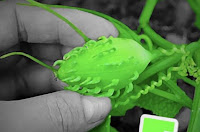Amazing Seeds - 2021
Amazing Seeds
Flaxseed
Flax is a plant that has been grown in Egypt and Asia for centuries. Linen plant with the scientific name Linum Usitatissimum is an agricultural plant that grows between 30 cm and 1 meter in length, blooms in blue, and lives for one year.
Flax seeds are about 5 mm long and are in the form of an egg. These oily seeds are flat, shiny, and odorless.
Flaxseed can be defined as a functional food because it contains healthy oils, antioxidants, and fibers.
Functional foods are defined as food or food components that provide additional benefits on the physiological and metabolic functions of the human being, in addition to meeting the basic nutritional requirements of the body, and serve to protect against diseases or to maintain a healthier life.
Flaxseed nutrients
It contains very healthy components, one of them is polyunsaturated fatty acids of omega-3 (such as alpha-linolenic acid - ALA). Omega-3 fatty acids are essential fatty acids. You can read this review to get more information on this topic. Besides, it contains lignans, antioxidants, fiber, protein. Consuming these nutrients can help reduce the risk of various medical ailments.
Nutritional values of flax seeds
Portion: 100 g
Name Amount / Unit
Energy 542 kcal
Protein 16.67 g
Total lipid (fat) 41.67 g
Carbohydrate, by difference 29.17 g
Fiber, total dietary 29.2 g
Calcium, Ca 250 mg
Iron, Fe 6 mg
Sodium, Na 21 mg
Fatty acids, total saturated 4.17 g
Fatty acids, total monounsaturated 8.33 g
Fatty acids, total polyunsaturated 29.17 g
Fatty acids, total trans 0 g
(Source: USDA)
For flaxseed oil vs fish oil, you can read this Review.
Flaxseed health benefits
Flaxseed benefits are many benefits and -like other plant-based foods- are rich in antioxidants. Antioxidants help to remove harmful molecules called free radicals from the body.
Too many free radicals in the body can cause the development of oxidative stress. This process can lead to cell damage and disease. Antioxidants help get rid of free radicals from the body.
Flaxseed ground contains a high amount of a nutrient called lignans. This nutrient component provides high antioxidant features. Flaxseed hulls contain large amounts of lignan and contain 100 times more lignan than even its closest competitor.
Improves cholesterol and heart health
Flaxseed help lowering of cholesterol, antihypertensive action, and anti-inflammatory action. Moreover, it has antiatherogenic effects and inhibition of arrhythmias. As detailed in this review, flaxseed nutrition facts lead to these beneficial cardiovascular actions (1).
Flaxseeds also contain phytosterols. Phytosterols help prevent cholesterol absorption in the intestines. So, phytosterols can help reduce “bad” cholesterol levels (LDL, low-density lipoprotein) in the body (2).
Actually, the flaxseed plant has some other bioactive components; cyclolinopeptides, proteins, and cyanogenic glycosides which may help cardiovascular help (3).
There are considerable researches on the flaxseed benefits for heart health (4, 5, 6).
Helps to prevent the risk of cancer
Flax seeds contain omega-3 fatty acids. Research suggests that these fatty acids may help prevent the growth of different cancer cells. Flaxseed can also slow tumor growth by preventing the lignans it contains from forming new blood vessels (7, 8, 9, 10).
Flaxseed may have help depression
A study in 2020 June revealed that flaxseed oil and flaxseed flour have an antidepressant-like effect (11). Another study in 2017 has exhibited a significant antidepressant-like effect (12).
However, there are not sufficient studies to prove this relationship so far.
So, if you are asked “is flaxseed good for you?” What is your answer?
Flaxseed may decrease constipation symptoms
Flaxseed is a good source of insoluble fiber that remains in the digestive tract after eating. In the intestine, it helps to increase bowel regularity by absorbing water (13, 14).
But there's a catch!
Flax seeds with too little water can worsen constipation. too much flaxseed or flaxseed oil can cause problems instead of benefits, like causing diarrhea.
Flaxseed benefits for hair
Flax seeds are rich in vitamin E. Other vitamins and omega-3 in its content are a very useful food for hair. It is beneficial for hair as well as for the scalp.
Recommendation how to add Flaxseed to your diet
It is beneficial not to consume flax seeds raw. Raw or immature flax seeds may contain toxins. Do not add flax seeds to your cooking. Instead, you can consume flax seeds as follows:
- Adding to breakfast cereals
- Mixing yogurt
- Make flaxseed smoothie or salads
Enjoy your flaxseed meal!
For flaxseed meal recipes you may click here!
Are you looking for a flaxseed substitute for the egg? Tap here!
How much flaxseed per day?
Flaxseed side effects
It is normally safe to consume flaxseed. Since its use will increase bowel movements and cause gastrointestinal effects, excessive amounts should not be used and should be careful (Applies for flaxseed oil side effects, too).
These possible adverse effects may not apply to everyone. Therefore, users should observe themselves. Another point to be considered in its consumption is to be taken with plenty of water. There is no problem in applying it to the skin.
Is there any risk of consuming flax seeds?
Individuals with one or more of the following medical conditions should consult their doctor before consuming flax seeds:
- Those who use blood thinners (warfarin or aspirin)
- Those using non-steroidal anti-inflammatory drugs
- Those who use cholesterol-lowering drugs
- Those with hormone-sensitive breast or uterine cancer
- Pregnant and breastfeeding people
- Those allergic to flaxseeds
Chia Seeds
Chia seeds are one of the staple foods of Aztec culture. The chia plant comes from the desert plant Salvia Hispanica. Salvia hispanica seed is often referred to as its common name "chia". Originating in the ancient Aztec civilization, this food is believed to be first grown in Central America. The edible part of the chia plant is its seeds.
Chia seeds are black or white in color. Its trade has increased over the past decade and has become a popular food. These tiny seeds can expand, absorbing and holding about 10 times their dry weight of liquid. When they absorb the liquid, the seeds become gel-like globules.
Chia seeds can be sprinkled on salads and foods, made into a pudding consistency, and consumed as a dessert and breakfast alternative. It can also be used in foods such as cakes and pastries. You can produce alternative foods and recipes with chia seeds. Those interested in healthy nutrition often prefer this product due to its high vegetable protein content.
Where Are Chia Seeds Grown?
Chia seeds are grown in Central Mexico and Guatemala. It is among the plants grown commercially in Central and South America. Chia seeds are among the foods used in industrial, nutritious drinks and foods in Argentina, Bolivia, Mexico, and Paraguay.
Chia Seed Nutrition Facts
Chia seeds contain approximately 6% water, 42% carbohydrates, 16% protein, and 31% fat. Fatty acids in chia seeds are unsaturated, 17-26% of the total fat is linoleic acid. The seeds are rich in omega-3 fatty acids and B vitamins, thiamine, and niacin.
Dried chia seeds are among the foods that are sources of riboflavin and folate. Chia seeds, which contain various minerals, contain calcium, iron, magnesium, manganese, phosphorus, and zinc.






good info, thanx
ReplyDeleteHi There,
ReplyDeleteThank you for sharing the knowledgeable blog with us I hope that you will post many more blog with us:-
With the potent combination of ashwagandha and astragalus, Be Calmboosts your body’s natural ability to combat stress and inflammation.
Email:sales@uspsilocybecubensis.com
Click here for more information:- more info